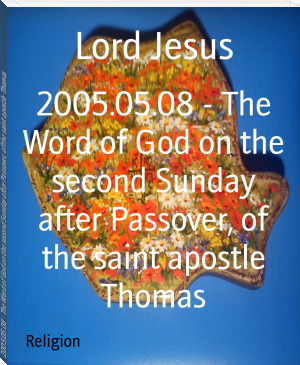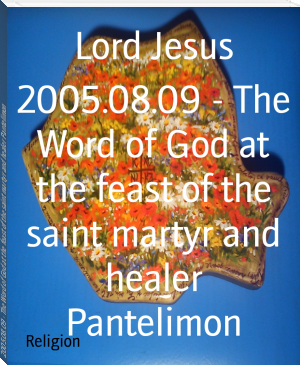The Story of a Soul - Saint Thérèse de Lisieux (best color ereader .TXT) 📗

- Author: Saint Thérèse de Lisieux
- Performer: -
Book online «The Story of a Soul - Saint Thérèse de Lisieux (best color ereader .TXT) 📗». Author Saint Thérèse de Lisieux
Until then I had not appreciated the beauties of the Holy Face; it was my dear Mother, Agnes of Jesus, who unveiled them to me. As she had been the first of her sisters to enter the Carmel, so she was the first to penetrate the mysteries of love hidden in the Face of Our Divine Spouse. Then she showed them to me and I understood better than ever, in what true glory consists. He whose "Kingdom is not of this world"[2] taught me that the only royalty to be coveted lies in being "unknown and esteemed as naught,"[3] and in the joy of self-abasement. And I wished that my face, like the Face of Jesus, "should be, as it were, hidden and despised,"[4] so that no one on earth should esteem me. I thirsted to suffer and to be forgotten.
Most merciful has been the way by which the Divine Master has ever led me. He has never inspired me with any desire and left it unsatisfied, and that is why I have always found His bitter chalice full of sweetness.
At the end of May, Marie, our eldest, was professed, and Thérèse, the Benjamin, had the privilege of crowning her with roses on the day of her mystical espousals. After this happy feast trials again came upon us. Ever since his first attack of paralysis we realised that my Father was very easily tired. During our journey to Rome I often noticed that he seemed exhausted and in pain. But, above all, I remarked his progress in the path of holiness; he had succeeded in obtaining a complete mastery over the impetuosity of his natural disposition, and earthly things were unable to ruffle his calm. Let me give you an instance.
During our pilgrimage we were in the train for days and nights together, and to wile away the time our companions played cards, and occasionally grew very noisy. One day they asked us to join them, but we refused, saying we knew little about the game; we did not find the time long—only too short, indeed, to enjoy the beautiful views which opened before us. Presently their annoyance became evident, and then dear Papa began quietly to defend us, pointing out that as we were on pilgrimage, more of our time might be given to prayer.
One of the players, forgetting the respect due to age, called out thoughtlessly: "Thank God, Pharisees are rare!" My Father did not answer a word, he even seemed pleased; and later on he found an opportunity of shaking hands with this man, and of speaking so pleasantly that the latter must have thought his rude words had either not been heard, or at least were forgotten.
His habit of forgiveness did not date from this day; my Mother and all who knew him bore witness that no uncharitable word ever passed his lips.
His faith and generosity were likewise equal to any trial. This is how he announced my departure to one of his friends: "Thérèse, my little Queen, entered the Carmel yesterday. God alone could ask such a sacrifice; but He helps me so mightily that even in the midst of tears my heart is overflowing with joy."
This faithful servant must needs receive a reward worthy of his virtues, and he himself claimed that reward. You remember the interview when he said to us: "Children, I have just come back from Alençon, and there, in the Church of Notre Dame, I received such graces and consolations that I made this prayer: 'My God, it is too much, yes, I am too happy; I shall not get to Heaven like this, I wish to suffer something for Thee—and I offered myself as a'"—the word victim died on his lips. He dared not pronounce it before us, but we understood. You know, dear Mother, the story of our trial; I need not recall its sorrowful details.
And now my clothing day drew near. Contrary to all expectations, my Father had recovered from a second attack, and the Bishop fixed the ceremony for January 10. The time of waiting had been long indeed, but now what a beautiful feast! Nothing was wanting, not even snow.
Do you remember my telling you, dear Mother, how fond I am of snow? While I was still quite small, its whiteness entranced me. Why had I such a fancy for snow? Perhaps it was because, being a little winter flower, my eyes first saw the earth clad in its beautiful white mantle. So, on my clothing day, I wished to see it decked, like myself, in spotless white. The weather was so mild that it might have been spring, and I no longer dared hope for snow. The morning of the feast brought no change and I gave up my childish desire, as impossible to be realised. My Father came to meet me at the enclosure door, his eyes full of tears, and pressing me to his heart exclaimed: "Ah! Here is my little Queen!" Then, giving me his arm, we made our solemn entry into the public Chapel. This was his day of triumph, his last feast on earth; now his sacrifice was complete, and his children belonged to God.[5] Céline had already confided to him that later on she also wished to leave the world for the Carmel. On hearing this he was beside himself with joy: "Let us go before the Blessed Sacrament," he said, "and thank God for all the graces He has granted us and the honour He has paid me in choosing His Spouses from my household. God has indeed done me great honour in asking for my children. If I possessed anything better I would hasten to offer it to Him." That something better was himself, "and God received him as a victim of holocaust; He tried him as gold in the furnace, and found him worthy of Himself."[6]
After the ceremony in the Chapel I re-entered the Convent and the Bishop intoned the Te Deum. One of the Priests observed to him that this hymn of thanksgiving was only sung at professions, but, once begun, it was continued to the end. Was it not right that this feast should be complete, since in it all other joyful days were reunited?
The instant I set foot in the enclosure again my eyes fell on the statue of the Child Jesus smiling on me amid the flowers and lights; then, turning towards the quadrangle, I saw that, in spite of the mildness of the weather, it was covered with snow. What a delicate attention on the part of Jesus! Gratifying the least wish of His little Spouse, He even sent her this. Where is the creature so mighty that he can make one flake of it fall to please his beloved?
Everyone was amazed, and since then many people, hearing of my desire, have described this event as "the little miracle" of my clothing day, and thought it strange I should be so fond of snow. So much the better, it shows still more the wonderful condescension of the Spouse of Virgins—of Him Who loves lilies white as the snow. After the ceremony the Bishop entered. He gave me many proofs of his fatherly tenderness, and, in presence of all the Priests, spoke of my visit to Bayeux and the journey to Rome; nor did he forget to tell them how I had put up my hair before visiting him. Then, laying his hand on my head, he blessed me affectionately. My mind dwelt with ineffable sweetness on the caresses Our Lord will soon lavish upon me before all the Saints, and this consoling thought was a foretaste of Heaven. I have just said that January 10 was a day of triumph for my dear Father. I liken it to the feast of the entry of Christ into Jerusalem, on Palm Sunday. As in the case of Our Divine Master, his day of triumph was followed by long days of sorrow; and, even as the agony of Jesus pierced the heart of His divine Mother, so our hearts were deeply wounded by the humiliations and sufferings of him, whom we loved best on earth. . . . I remember that in the month of June 1888, when we were fearing another stroke of paralysis, I surprised our Novice Mistress by saying: "I am suffering a great deal, Mother, yet I feel I can suffer still more." I did not then foresee the trial awaiting us. I did not know that on February 12, one month after my clothing day, our beloved Father would drink so deeply of such a bitter chalice. I no longer said I could suffer more, words cannot express our grief; nor shall I attempt to describe it here.
In Heaven, we shall enjoy dwelling on these dark days of exile. Yet the three years of my Father's martyrdom seem to me the sweetest and most fruitful of our lives. I would not exchange them for the most sublime ecstasies, and my heart cries out in gratitude for such a priceless treasure: "We have rejoiced for the days wherein Thou hast afflicted us."[7] Precious and sweet was this bitter cross, and our hearts only breathed out sighs of grateful love. We no longer walked—we ran, we flew along the path of perfection.
Léonie and Céline, though living in the world, were no longer of the world. The letters they wrote were full of the most edifying resignation. And what talks I had with Céline! Far from separating us, the grating of the Carmel united us more closely: the same thoughts, the same desires, the same love for Our Lord and for souls, made our very life. Not a word concerning things of earth entered into our conversation; but, just as in former days we lifted longing eyes to Heaven, so now our hearts strained after the joys beyond time and space, and, for the sake of an eternal happiness, we chose to suffer and be despised here below.
Though my suffering seemed to have reached its height, yet my attraction thereto did not grow less, and soon my soul shared in the trials my heart had to bear. My spiritual aridity increased, and I found no comfort either in Heaven or on earth; yet, amid these waters of tribulation that I had so thirsted for, I was the happiest of mortals.
Thus passed the time of my betrothal, too long a time for me. At the end of the year you told me, dear Mother, that I must not yet think of my profession, as our Ecclesiastical Superior expressly forbade it. I had therefore to wait for eight months more. At first I found it very difficult to be resigned to such a sacrifice, but divine light penetrated my soul before long.
At this time I was using for my meditations Surin's Foundations of the Spiritual life. One day during prayer, it was brought home to me that my too eager desire to take my vows was mingled with much self-love; as I belonged to Our Lord and was His little plaything to console and please Him, it was for me to do His Will, not for Him to do mine. I also understood that a bride would not be pleasing to the bridegroom on her wedding day were she not magnificently attired. But, what had I made ready? So I said to Our Lord: "I do not ask Thee to hasten the day of my profession, I will wait as long as Thou pleasest, only I cannot bear that through any fault of mine my union with Thee should be delayed; I will set to work and carefully prepare a wedding-dress enriched with diamonds and precious stones, and, when Thou findest it sufficiently rich, I am sure that nothing will keep Thee from accepting me as Thy Spouse."
I took up the task with renewed zest. Since my clothing day I had received abundant lights on religious perfection, chiefly concerning the vow of poverty. Whilst I was a postulant I liked to have nice things to use and to find everything needful ready to hand. Jesus bore with me patiently, for He gives His light little by little. At the beginning of my spiritual life, about the age of fourteen, I used to ask myself how, in days to come, I should more clearly understand the true meaning of perfection. I imagined I then understood it completely, but I soon came to realise that the more one advances along this path the farther one seems from the goal, and now I am resigned to be always imperfect, and I even find joy therein.
To return to the lessons





Comments (0)